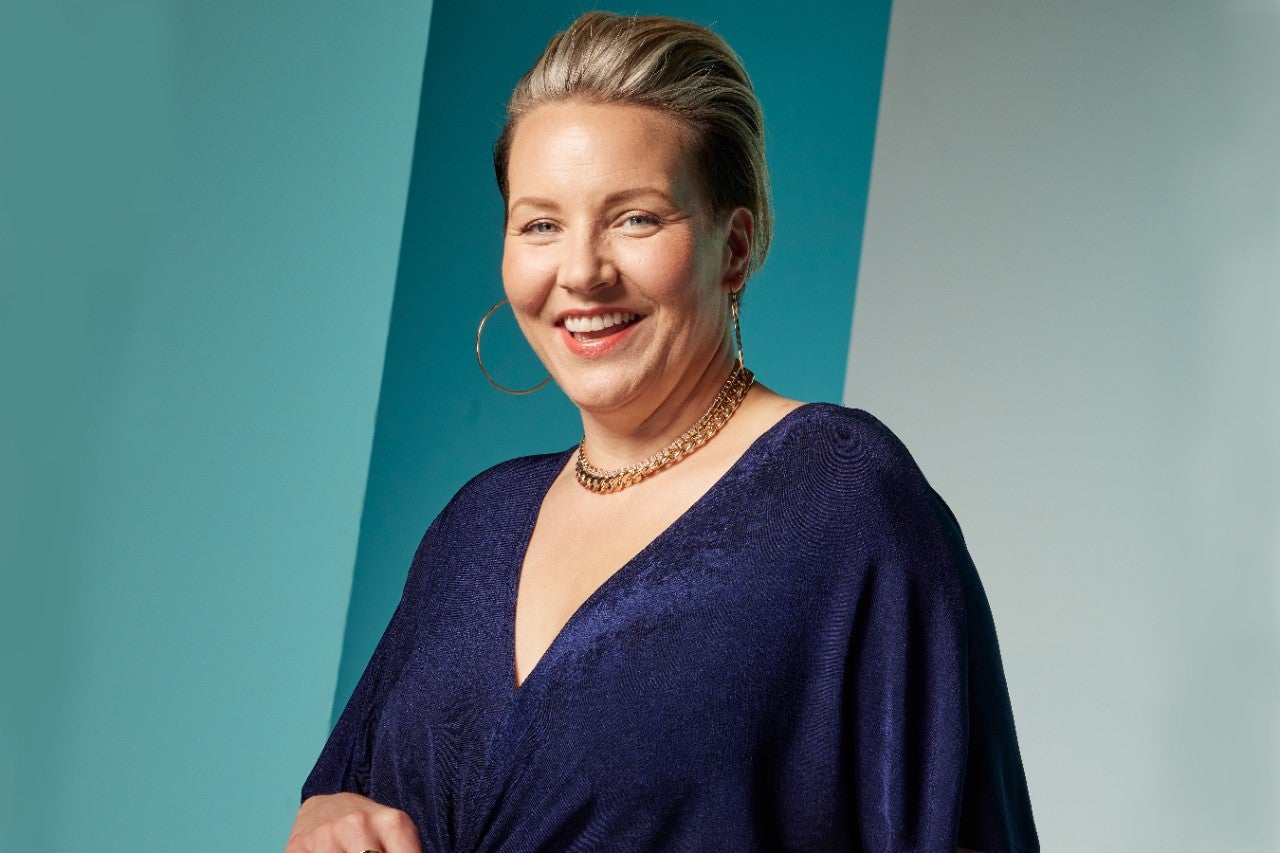Actual Natrelle® patient.
Individual results may vary.
See our new privacy terms at https://privacy.abbvie/.
Actual Natrelle® patients.
Individual results may vary.
Breast surgery is a personal choice. Whether you are looking to add fullness, regain volume, or find your new normal post-mastectomy, Natrelle® offers the largest range of breast implant options to give a customized look for every curve, for every shape, for every BODY.
Natrelle®’s commitment to you is backed by 35 years of excellence and innovation in cosmetic and reconstructive surgery with the highest manufacturing and safety standards.
The Natrelle® ConfidencePlus® warranty offers you more coverage for your breast implants—all designed for your peace of mind and satisfaction.
Customized to YOU
With Natrelle®, your surgeon can give you a customized look you love. Natrelle® is the #1 selected breast implant by plastic surgeons,* with a collection of over 300 implant options to choose from.
Learn more about your choices—get a look you love.
*Based on July 2023 surgeon data (n=305)
A look MADE FOR YOU
Whether you are looking for a subtle change or a fuller look, the only thing that matters is the look you love.
Discuss your goals and implant choices in consultation with your board-certified plastic surgeon to find the look that’s right for you.
A Projection to
FIT YOUR PROFILE
The profile and projection of your implants are important for your aesthetic results. Different implant profiles offer varying levels of forward projection from your chest for your desired fullness.
Natrelle® offers five different profile options, ranging from low to extra full, so you can find your perfect look.
SOFT to the Touch
It’s not just about the look, it’s also about the feel. Whether you want a firmer or softer feel, Natrelle® is the only implant brand that offers three gummy levels.
Natrelle® gummy implants are made with a cohesive gel that holds shape while maintaining a soft feel. We surround the gel with a patented shell technology and an INTRASHIEL™ barrier layer designed to keep your gel in place. Ask to feel the implants at your consultation.†
†Significance inside the body has not been established.
Natrelle® Breast Implants IMPORTANT SAFETY INFORMATION AND APPROVED USES
Breast implants are not considered lifetime devices. The longer people have them, the greater the chances are that they will develop complications, some of which will require more surgery.
Breast implants have been associated with the development of a cancer of the immune system called breast implant–associated anaplastic large cell lymphoma (BIA-ALCL). This cancer occurs more commonly in patients with textured breast implants than smooth implants, although rates are not well defined. Some patients have died from BIA-ALCL.
Patients receiving breast implants have reported a variety of systemic symptoms, such as joint pain, muscle aches, confusion, chronic fatigue, autoimmune diseases, and others. Individual patient risk for developing these symptoms has not been well established. Some patients report complete resolution of symptoms when the implants are removed without replacement.
Who can get breast implants?
Natrelle® Breast Implants are approved for the following:
- Breast augmentation for women at least 22 years old for silicone-filled implants and for women at least 18 years old for saline-filled implants. Breast augmentation includes primary breast augmentation to increase the breast size and revision surgery to correct or improve the result of a primary breast augmentation
- Breast reconstruction. This includes primary breast reconstruction to replace breast tissue that has been removed due to cancer or trauma or that has failed to develop properly due to a severe breast abnormality. This also includes revision surgery to correct or improve the result of a primary breast reconstruction
Who should NOT get breast implants?
Breast implant surgery should NOT be performed in:
- Women with active infection anywhere in their body
- Women with existing cancer or precancer of their breast who have not received adequate treatment for those conditions
- Women who are currently pregnant or nursing
What should I tell my doctor?
Tell your doctor if you have any of the following conditions, as the risks of breast implant surgery may be higher:
- Autoimmune diseases (eg, lupus and scleroderma)
- A weakened immune system (eg, taking medications to decrease the body’s immune response)
- Planned chemotherapy or radiation therapy following breast implant placement
- Conditions or medications that interfere with wound healing and blood clotting
- Reduced blood supply to breast tissue
- Clinical diagnosis of depression or other mental health disorders, including body dysmorphic disorder and eating disorders
- Those with a diagnosis of depression or other mental health disorders should wait for resolution or stabilization of these conditions prior to undergoing breast implantation surgery
What else should I consider?
- There is a Boxed Warning for breast implants. Please see bold text at beginning
- Many changes to your breasts following implantation are irreversible. If you later choose to have your implants removed and not replaced, you may experience dimpling, puckering, wrinkling, or other cosmetic changes, which may be permanent
- Breast implantation is likely not a one-time surgery. The longer implants are in place, the greater the potential risk for complications. You will likely need additional surgeries on your breasts due to complications or unacceptable cosmetic results. Thus, you should also consider the complication rates for later (revision) surgery since you may experience these risks in the future
- Cancer treatments and surgery will affect the outcome and timing of breast reconstruction
- Breast implants may affect your ability to breastfeed, either by reducing or eliminating milk production
- Rupture of a silicone-filled breast implant is most often silent. Even if you have no symptoms, you should have your first ultrasound or MRI at 5 to 6 years after your initial implant surgery and then every 2 to 3 years thereafter regardless of whether your implants are for augmentation or reconstruction. If you have symptoms of or uncertain ultrasound results for breast implant rupture, an MRI is recommended. Additional imaging may be required depending on your medical history and status. The health consequences of a ruptured silicone gel-filled breast implant have not been fully established
- Routine screening mammography for breast cancer will be more difficult, and implants may rupture during the procedure. Perform self-examination every month for cancer screening and ask your surgeon to help you distinguish the implant from your breast tissue. Lumps, persistent pain, swelling, hardening, or changes in implant shape should be reported to your surgeon and possibly evaluated with imaging
What are key complications with breast implants?
Key complications include reoperation, implant removal with or without replacement, implant rupture with silicone-filled implants, implant deflation with saline-filled implants, and capsular contracture (severe scar tissue around the implant). Other complications include breast pain, swelling, asymmetry, wrinkling/rippling, implant malposition nipple complications, hypertrophic scarring, and implant palpability/visibility.
Talk to your doctor about other complications.
For more information, see the patient brochures at rxabbvie.com
To report a problem with Natrelle® Breast Implants, please call Allergan® at 1-800-624-4261.
The sale and distribution of Natrelle® Breast Implants is restricted to licensed physicians who provide information to patients about the risks and benefits of breast implant surgery.
Natrelle® Breast Implants IMPORTANT SAFETY INFORMATION AND APPROVED USES
Breast implants are not considered lifetime devices. The longer people have them, the greater the chances are that they will develop complications, some of which will require more surgery.
Breast implants have been associated with the development of a cancer of the immune system called breast implant–associated anaplastic large cell lymphoma (BIA-ALCL). This cancer occurs more commonly in patients with textured breast implants than smooth implants, although rates are not well defined. Some patients have died from BIA-ALCL.
Patients receiving breast implants have reported a variety of systemic symptoms, such as joint pain, muscle aches, confusion, chronic fatigue, autoimmune diseases, and others. Individual patient risk for developing these symptoms has not been well established. Some patients report complete resolution of symptoms when the implants are removed without replacement.
Who can get breast implants?
Natrelle® Breast Implants are approved for the following:
- Breast augmentation for women at least 22 years old for silicone-filled implants and for women at least 18 years old for saline-filled implants. Breast augmentation includes primary breast augmentation to increase the breast size and revision surgery to correct or improve the result of a primary breast augmentation
- Breast reconstruction. This includes primary breast reconstruction to replace breast tissue that has been removed due to cancer or trauma or that has failed to develop properly due to a severe breast abnormality. This also includes revision surgery to correct or improve the result of a primary breast reconstruction
Who should NOT get breast implants?
Breast implant surgery should NOT be performed in:
- Women with active infection anywhere in their body
- Women with existing cancer or precancer of their breast who have not received adequate treatment for those conditions
- Women who are currently pregnant or nursing
What should I tell my doctor?
Tell your doctor if you have any of the following conditions, as the risks of breast implant surgery may be higher:
- Autoimmune diseases (eg, lupus and scleroderma)
- A weakened immune system (eg, taking medications to decrease the body’s immune response)
- Planned chemotherapy or radiation therapy following breast implant placement
- Conditions or medications that interfere with wound healing and blood clotting
- Reduced blood supply to breast tissue
- Clinical diagnosis of depression or other mental health disorders, including body dysmorphic disorder and eating disorders
- Those with a diagnosis of depression or other mental health disorders should wait for resolution or stabilization of these conditions prior to undergoing breast implantation surgery
What else should I consider?
- There is a Boxed Warning for breast implants. Please see bold text at beginning
- Many changes to your breasts following implantation are irreversible. If you later choose to have your implants removed and not replaced, you may experience dimpling, puckering, wrinkling, or other cosmetic changes, which may be permanent
- Breast implantation is likely not a one-time surgery. The longer implants are in place, the greater the potential risk for complications. You will likely need additional surgeries on your breasts due to complications or unacceptable cosmetic results. Thus, you should also consider the complication rates for later (revision) surgery since you may experience these risks in the future
- Cancer treatments and surgery will affect the outcome and timing of breast reconstruction
- Breast implants may affect your ability to breastfeed, either by reducing or eliminating milk production
- Rupture of a silicone-filled breast implant is most often silent. Even if you have no symptoms, you should have your first ultrasound or MRI at 5 to 6 years after your initial implant surgery and then every 2 to 3 years thereafter regardless of whether your implants are for augmentation or reconstruction. If you have symptoms of or uncertain ultrasound results for breast implant rupture, an MRI is recommended. Additional imaging may be required depending on your medical history and status. The health consequences of a ruptured silicone gel-filled breast implant have not been fully established
- Routine screening mammography for breast cancer will be more difficult, and implants may rupture during the procedure. Perform self-examination every month for cancer screening and ask your surgeon to help you distinguish the implant from your breast tissue. Lumps, persistent pain, swelling, hardening, or changes in implant shape should be reported to your surgeon and possibly evaluated with imaging
What are key complications with breast implants?
Key complications include reoperation, implant removal with or without replacement, implant rupture with silicone-filled implants, implant deflation with saline-filled implants, and capsular contracture (severe scar tissue around the implant). Other complications include breast pain, swelling, asymmetry, wrinkling/rippling, implant malposition nipple complications, hypertrophic scarring, and implant palpability/visibility.
Talk to your doctor about other complications.
For more information, see the patient brochures at rxabbvie.com
To report a problem with Natrelle® Breast Implants, please call Allergan® at 1-800-624-4261.
The sale and distribution of Natrelle® Breast Implants is restricted to licensed physicians who provide information to patients about the risks and benefits of breast implant surgery.



